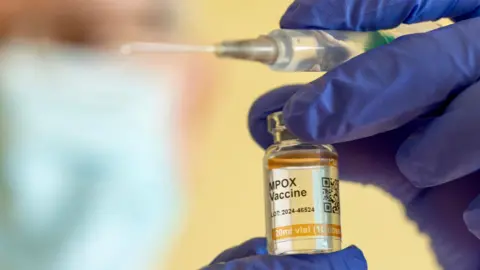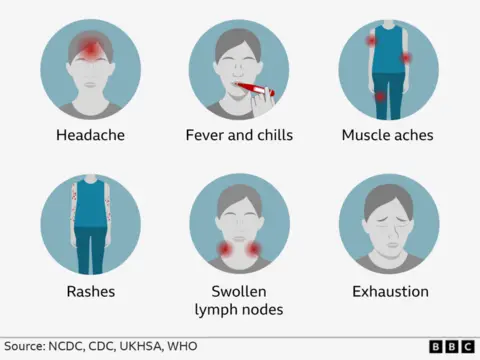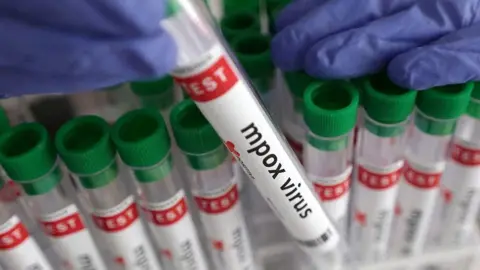First case of newer mpox variant detected in Ireland
 Getty Images
Getty ImagesThe first case of a newer, more spreadable variant of mpox has been detected in the Republic of Ireland, the Health Service Executive (HSE) has said.
The Irish resident, who was infected with the Clade 1 variant, had recently returned from the Democratic Republic of Congo.
The virus - formerly known as monkeypox - was declared a global health emergency by the World Health Organization last August.
The HSE said that while it is the first Irish case of the newer variant, it is not unexpected and the risk to the public remains low.
The individual is now receiving specialist care in a hospital in Dublin.
The HSE added that those who have received two doses of the mpox vaccine, or previously had the virus, are considered to have protection against severe illness caused by the newer variant.
Director of National Health Protection Dr Éamonn O'Moore said the HSE is fully prepared to respond to this case.
"We have been working alongside international partners and National Health Protection has been monitoring mpox closely since the outbreak in Democratic Republic of Congo first emerged," Dr O'Moore added.
What is mpox?
 Getty Images
Getty ImagesMpox is caused by a virus in the same family as smallpox but is usually much less harmful.
It spreads through direct contact with rashes, skin lesions or scabs caused by the virus, including during sexual contact, kissing, cuddling and other skin-to-skin contact.
There is also a risk from contact with bodily fluids; from contact with bedding or towels or clothing; and through close and prolonged face-to-face contact, such as talking, breathing, coughing and sneezing.
Common symptoms of mpox include flu-like symptoms, followed by a skin rash and pus-filled lesions which can last up to a month.
Once the fever breaks, a rash can develop. This can be extremely itchy or painful, often beginning on the face before spreading to other parts of the body, most commonly the palms of the hands and soles of the feet.

In serious cases, lesions can attack the whole of the body, especially the mouth, eyes and genitals.
The rash goes through different stages before finally forming a scab, which later falls off and can cause scarring.
In many cases the infection lasts between 14 and 21 days before clearing up on its own.
But mpox can be fatal, particularly for vulnerable groups - including small children.
Outbreaks can be controlled by preventing infections with vaccines, though these are usually only available for people at risk or those who have been in close contact with an infected person.
What is the newer variant?
 Reuters
ReutersThere are broadly two main types of mpox - Clade 1, which is often more serious, and Clade 2.
A previous mpox public health emergency, declared in 2022, was caused by the relatively mild Clade 2.
HSE said one case of Clade 1 has been detected in the Republic of Ireland.
Cases of Clade 2 mpox in Ireland remain low, with eight cases reported to date in 2025.
There were 25 cases of Clade 2 mpox confirmed in Ireland in 2024, 13 cases in 2023 and 227 cases in 2022.
Experts are now concerned about the Clade 1 virus that has been spreading quickly in west and central Africa since 2023.
Health officials experts have described it as "incredibly worrying", and the World Health Organization (WHO) declared the outbreaks in Africa as "a public health emergency of international concern".
Millions of vaccines are being sent to the hardest-hit areas of east and central Africa to help control the outbreak.
Sweden, Germany, India, Thailand, Canada and the US have all seen imported cases of Clade 1b but there has been little onward spread to date.
On Tuesday, 12 new mpox vaccination sites opened across England.
